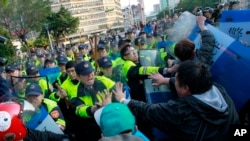TAIPEI —
Police clashed with hundreds of protesters in Taipei Monday after the group upset over a trade deal with China broke into the government’s chief office complex. As hundreds more remain camped out in Taiwan’s parliament, the government weighs what to do next.
About 2,000 police officers expelled hundreds of protesters from Taiwan’s guarded cabinet offices before dawn on Monday. The government mobilized riot squads and water cannons to oust demonstrators in a five-hour struggle. Protesters want to stop quick approval of the trade deal, calling that approach risky as China claims sovereignty over self-ruled Taiwan and wants political reunification.
Lin Nan-hsin, a 20-year-old protester from a university in central Taiwan, was among those expelled by police.
He said there are two camps of protesters, one that advocates peace and the other that prefers a more extreme form of protest as the only way of getting the government’s attention. Lin said that in the end, there was a discussion with the lead protest planners about whether to break into the cabinet complex and finally a go-ahead was given.
Taiwan and China signed a service trade pact in June following several other trade and investment agreements reached since 2008. Taiwan says the deal to open 80 Taiwanese service trade categories to China and 64 Chinese sectors to Taiwan will modernize a large segment of the island’s economy and help build a foundation for free trade agreements with other nations. Supporters claim it will lead to more jobs for workers and more choices for consumers. Opponents are skeptical of the deal’s economic benefits and wary of the government’s bid to forge closer ties with Beijing.
Analysts in Taipei expect protests to delay passage of the trade pact, setting back Taiwanese enterprises and upsetting officials in China.
As legislators prepared to ratify the deal this month or next, hundreds of university students broke into parliament last Tuesday night and have occupied it since then. They first called for an item-by-item vote to scope out any clauses bad for Taiwan, but many are now calling for a renegotiation of the whole deal.
President Ma Ying-jeou defended the trade pact at a Sunday news conference, saying that previous market openings gave Taiwanese consumers more choices.
He said countries all over the world worry about local industry when faced with opening markets. Taiwan has been open since early days, he added, and by the 1960s the American service industry already had entered Taiwan. He said the result was that McDonalds, KFC and Starbucks all came in.
But the president’s comments inflamed protests, attracting tens of thousands around the island and leading to the cabinet complex break-in where clashes caused dozens of injuries. Taiwan’s premier said Monday protesters had usurped the cabinet offices. Police arrested dozens of protesters and were questioning dozens more.
Many protesters ousted from the cabinet offices have returned to their positions at parliament and say they will not back down. Political analysts in Taiwan say government officials must negotiate face to face with demonstrators to stop the protests altogether.
About 2,000 police officers expelled hundreds of protesters from Taiwan’s guarded cabinet offices before dawn on Monday. The government mobilized riot squads and water cannons to oust demonstrators in a five-hour struggle. Protesters want to stop quick approval of the trade deal, calling that approach risky as China claims sovereignty over self-ruled Taiwan and wants political reunification.
Lin Nan-hsin, a 20-year-old protester from a university in central Taiwan, was among those expelled by police.
He said there are two camps of protesters, one that advocates peace and the other that prefers a more extreme form of protest as the only way of getting the government’s attention. Lin said that in the end, there was a discussion with the lead protest planners about whether to break into the cabinet complex and finally a go-ahead was given.
Taiwan and China signed a service trade pact in June following several other trade and investment agreements reached since 2008. Taiwan says the deal to open 80 Taiwanese service trade categories to China and 64 Chinese sectors to Taiwan will modernize a large segment of the island’s economy and help build a foundation for free trade agreements with other nations. Supporters claim it will lead to more jobs for workers and more choices for consumers. Opponents are skeptical of the deal’s economic benefits and wary of the government’s bid to forge closer ties with Beijing.
Analysts in Taipei expect protests to delay passage of the trade pact, setting back Taiwanese enterprises and upsetting officials in China.
As legislators prepared to ratify the deal this month or next, hundreds of university students broke into parliament last Tuesday night and have occupied it since then. They first called for an item-by-item vote to scope out any clauses bad for Taiwan, but many are now calling for a renegotiation of the whole deal.
President Ma Ying-jeou defended the trade pact at a Sunday news conference, saying that previous market openings gave Taiwanese consumers more choices.
He said countries all over the world worry about local industry when faced with opening markets. Taiwan has been open since early days, he added, and by the 1960s the American service industry already had entered Taiwan. He said the result was that McDonalds, KFC and Starbucks all came in.
But the president’s comments inflamed protests, attracting tens of thousands around the island and leading to the cabinet complex break-in where clashes caused dozens of injuries. Taiwan’s premier said Monday protesters had usurped the cabinet offices. Police arrested dozens of protesters and were questioning dozens more.
Many protesters ousted from the cabinet offices have returned to their positions at parliament and say they will not back down. Political analysts in Taiwan say government officials must negotiate face to face with demonstrators to stop the protests altogether.




